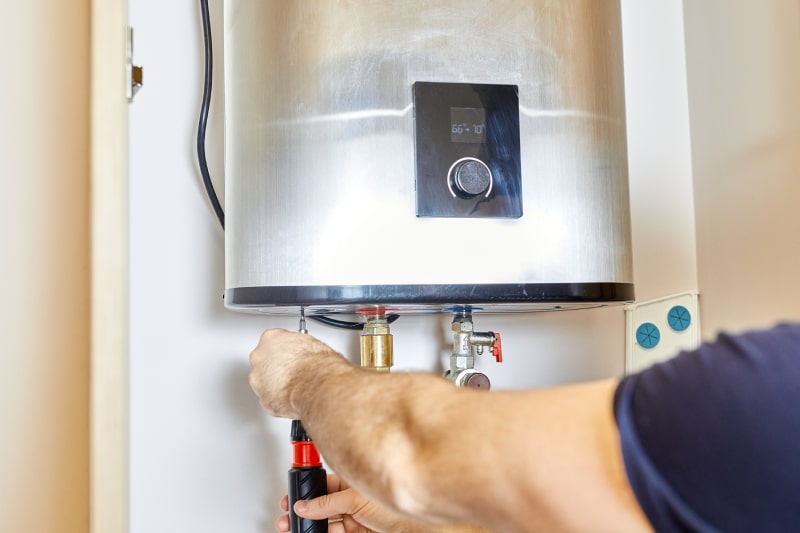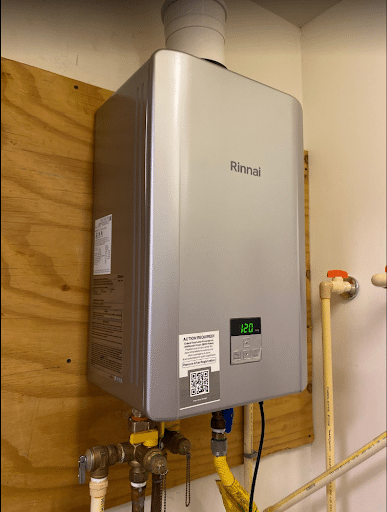
These days, tankless water heaters put a virtually unlimited supply of hot water “on tap” for your kitchen and bathroom while avoiding many of the supply and maintenance issues of traditional tank water heaters. They’re also more energy efficient than old-school water tanks.
That can make it all the more surprising when things do go wrong. Below we take a look at some common problems with tankless water heater problems, their causes, and how to get them fixed. Read on to learn more about:
- Common Tankless Water Heater Problems
- Tankless Heater Troubleshooting Tips
- Whether Tankless Water Heaters are Worth the Investment
Help! My Tankless Water Heater Is Not Working
Here are ten of the most common tankless water heater issues you’re likely to come across.
1. No Hot Water
When your tankless water heater simply fails to produce any hot water at all, it’s a problem right away. A complete failure like this usually has to do with your gas lines, power supply, or flame ignition system.
2. Not Enough Hot Water
Not enough water to go around is a problem tankless heaters are supposed to prevent! If you’re still being left in the cold you may need to look at how your household’s peak demand lines up with your total water heater capacity.
3. Water Isn’t Hot Enough
Water not hot enough for a morning shave or to do the dishes? As a common safety precaution, warm water is most likely your thermostat setting, but anything less can also be a sign of a failing or underperforming water heater.
4. Fluctuating Water Temperature
Sudden changes in water temperature can also be the result of an overtaxed heating system. Too many users on an undersized heater can lead to sudden (and potentially dangerous) changes in water temperature, especially during peak demand.
5. ‘Cold Water Sandwich’
This is when the hot water that flows when you first open a faucet is followed by a brief burst of cold water. This is a common problem with tankless heaters, caused by the initial “head” of cold water that passes through the unit too quickly to be heated. An overzealous water saver can also fool the heater into thinking that the water was shut off, resulting in the heater cycling on and off while you are using a small amount of water.
6. Low Water Pressure
Low water pressure can occur unexpectedly or creep up on you over time. It can be the result of clogged filters, aerators, or pipes almost anywhere in your water supply system but can also be a sign that your unit requires maintenance to clean or replace internal components.
7. Banging or Rumbling Sounds
Modern tankless heaters are very quiet. Unexpected banging, clicking, or whining noises can be caused by air trapped in pipes after repairs or a service interruption but can also be caused by loose parts or mountings.
8. Leaks
Water leaks can cause a lot of damage if not detected and fixed promptly. While water leaking from a tankless unit may be due to loose connections, it may also result from corrosion or internal damage to your heater.
9. Smelly or Discolored Water
Unpleasant odors or discolored water may occur as your unit ages or if it is left unused for some time. It is usually due to bacterial growth, sediment buildup, or rust within your unit, but can also be the result of problems with your local water supply.
10. High Energy Bills
Spiking electricity or gas consumption might be the first sign you have that your tankless water heater is not working properly. You’ll also pay more for energy if your unit is overloaded or if your use patterns change dramatically — for example when relatives come to stay!
Tankless Water Heater Troubleshooting Tips
So much for the problems, what about the solutions? Here’s how to go about troubleshooting your water heater and plumbing system. We’ll help you identify easy fixes you can do yourself and identify the telltale signs that it’s time to consult a professional.
No Hot Water
- Check your power supply: A tripped fuse or power outage will cut off your electric tankless heater and may prevent a gas unit’s ignition unit from working.
- Inspect your gas supply: For gas heaters, make sure your gas valve is fully opened and gas is flowing. If you’re worried about a gas leak, call a licensed gas contractor.
- Check your ignition system: Turning your faucet on should trigger an ignition. For gas units, follow the instructions to ensure your pilot light is burning.
- Still no luck? Call the professionals: Robinson’s Plumbing supplies quality tankless electric and gas heaters including Rheem, Navien, and Rinnai products.
Not Enough Hot Water
- Check peak demand: Compare your household’s maximum hot water requirements with your total heater capacity.
- Install more capacity?: Install a larger unit or add additional units to spread the load.
- Need help: We can help you do the math and supply and install the added heating capacity your family needs.
Water Isn’t Hot Enough
- Check your thermostat adjustment: Your thermostat might have been set lower to prevent accidental scalding. Nudge it up, but avoid dangerous temperatures.
- Schedule maintenance: Still not heating up? Your unit might need to be flushed and descaled by a plumbing professional. Most manufacturers recommend flushing and descaling a tankless heater every year to maximize its life.
Fluctuating Water Temperature
- Limit simultaneous use: Chances are your fluctuations happen when your heater is supplying several points at once. The simple solution is to stagger usage.
- Add capacity: You can limit inconvenience by adding additional units or getting a properly sized unit to serve your kitchen, bathroom, or appliances. Let us help take the “yelp” out of shower time!
‘Cold Water Sandwich’
- Install a recirculating or hybrid system: A cold water “gap” is inherent with all pure tankless water heater systems. You can reduce or eliminate it by adding a recirculation pump to your piping system.
Low Water Pressure
- Trace the source: Try to figure out if the problem lies in your water heater or further back in the system. Are other water flows affected or just your heater?
- Descale your system: Try running a descaling solution through your heater to loosen any calcium deposits that might be restricting flow.
- Service your heater: Have Robinson’s Plumbing or other licensed professionals check your unit and replace any faulty or clogged parts.
Strange Noises
- Air in the system: Check if the sounds are coming from your heater. If they are, loosen and bleed connections to remove trapped air. Be sure to tighten them again.
- Tighten loose mountings: Repeated ignition and heat expansion can loosen mounting brackets or connections. Check for any loose components and secure them.
- Call a professional: No luck? Unusual or increased mechanical noise may mean your unit needs to be serviced or replaced. Call Robinson’s for a professional opinion.
Water Leaks
- Tighten connections: The most likely cause of a water leak is a loose or corroded connection. Check your incoming and outgoing connections and surrounding piping.
- Check for corrosion: Have your unit inspected for internal corrosion. Talk to Robinson’s Plumbing about repairing the corroded parts or a replacement heater.
Smelly or Discolored Water
- Trace the source: Check online or call your local water plant to see if there have been any recent changes in water quality.
- Water treatment: If the problem lies with your water supply, consider installing a whole-house water softener or water filter system.
- Flush your system: Flush and descale your tank to remove sediment or bacteria, especially if you haven’t used it for a while. If the problem persists, it may be time for a new water heater.
High Energy Bills
- Review your use: If energy costs have spiked, first consider if changing daily habits has increased your household’s hot water demand.
- Energy audit: Have a qualified professional check your water heater. Calcium or sediment buildup may affect the efficiency of your heat exchanger or other equipment.
Warning Lights & Error Codes
- Check your manual: Your paperwork should explain the meaning of each error code and the steps you should take to remedy each problem.
- Call for help: Note the code and the time it occurred and give Robinson’s Plumbing a call. We’ll work out the cause and provide the services you need.
Are Tankless Water Heaters Worth The Investment?
Tankless water heaters have revolutionized how hot water is supplied to thousands of homes and businesses in recent years. Rather than keeping dozens of gallons of water hot for hours on end, tankless units ensure that water heats only when it is needed.
As a result, gas tankless water heaters use less energy than traditional units. A Department of Energy study found that smaller tankless heaters can be up to 35% more energy efficient than conventional tank heaters.
Other advantages include:
- Endless hot water: Tankless water heaters heat water on demand and provide a never-ending hot water supply.
- Longer lifespan: Tankless water heaters can last up to 20 years with proper maintenance. A conventional one lasts only 8-12 years.
- Space-saving: Tankless water heaters are far more compact than conventional heaters, freeing up valuable room in your home or business.
Think a tankless heater might work for you? Here are a few things to consider before deciding to go tankless:
Is Your Conventional Water Heater Taking Up Valuable Space?
Large, bulky tank water heaters take up a lot of room. Tankless units let you take back precious storage space in your home because they’re mounted on a wall instead of being installed in corners, closets, basements, and utility rooms.
What Are Your Family’s (or Business’s) Hot Water Needs?
The EPA estimates that a family of four uses 400 gallons of water per day. Tankless water heaters provide hot water on demand, so regardless of household usage, you save money and energy, as well as reduce waste by only heating water when you need it.
How Long Do You Expect to Own Your Home?
Tankless models can cost up to three times as much as a tank water heater but offer greater energy savings over a longer lifetime. Tankless heaters are a good choice if you’re investing in your home for the long run.
What About Maintenance and Repairs?
Providing hot water only as it is needed is also easier on your equipment. You’ll see faster returns on your investment through reduced maintenance and fewer service calls.

Professional Tankless Water Heater Repair & Installation
Invest in energy-efficient, convenient, and long-lasting tankless water technology with confidence. Robinson’s Plumbing supplies, installs, and repairs leading-brand tankless water heaters throughout the Richmond area.
Our certified and trustworthy technicians will professionally install and support your commercial or residential water heater. And if you aren’t sure which water heater is best for your home, business, or needs, we’ll gladly provide you with our expert opinion.
We guarantee our parts and labor for two years while providing transparent quotes through our “No Surprises” pricing model— the price we quote is the price you pay!
Contact us today for a quote or click below to learn more about our quality, affordable tankless water heater services.
